

JIWAJOURNAL The

BELOW DECK: MIGRANT WORKERS KEEP THE CRUISE INDUSTRY AFLOAT
MOTIVATIONS OF MIGRATION: INDONESIANS OVERCOME CHALLENGES IN PURSUIT OF BETTER OPPORTUNITIES ON THE HOOK: POOR TREATMENT OF MIGRANT WORKERS DAMAGES ECONOMIC OPPORTUNITIES

The
A publication of Jiwa International, devoted to telling the stories of migrant workers around the world and keeping you up to date about the work of Jiwa to meet the physical, emotional, and spiritual needs of this vulnerable population
POSTMASTER: Send address changes to Jiwa International
213 N Main St Spring Grove, PA 17362 contact@jiwainternational org
President & Founders
Nathan Conklin
Laura Ward Conklin
Jiwa Journal Editors
Nathan Conklin
Adam Schmehl
Special thanks to Anna Stempel for the design of the “Fill our Space” campaign
Jiwa International Board of Directors
Chad Brubaker
Emily Brubaker
Rev Nate Conklin
Dr Vincent LaFrance
Susan Millikan
For advertising opportunities in The Jiwa Journal, please contact us at contact@jiwainternational org
FROM THE FOUNDERS
Jiwa International just recently passed its one year anniversary and we are so excited to see what God has done in and through Jiwa in this first year What started out as a crazy idea has continued to develop and grow faster than we would have imagined
In this volume of The Jiwa Journal, you’ll read about our partners on the ground in Taiwan, the launch of Cafe Jiwa, as well stories of other migrant workers around the world As global shifts continue to happen in politics, economics, and society, migrant workers find themselves increasingly important yet still without systematic protections in place to ensure that all players weather these changes in a just and equitable fashion
Nathan& Laura JIWAJOURNAL
Subscribe to The Jiwa Journal to read updates about the organization, world news as it relates to migrant workers, and other interesting articles To subscribe to digital and/or print editions, go to www jiwainternational org/journal
We are pleased to provide this resource for free as we view this as part of our mission to advocate for migrant workers by telling their stories However, if you would like to help cover the development and distribution costs of The Jiwa Journal, you may make a donation to Jiwa International at www jiwaintl org/give
Copyright Jiwa International, 2024
In Taiwan, we have been establishing Jiwa International to support the Indonesian migrant worker population. Through surveys, hosting events, and now opening a cafe We’ve been getting to know just a few of the 300,000 Indonesians who live and work in Taiwan As these relationships grow, we learn more about their circumstances and how Jiwa can play a part in advocating for systemic protections for these foreign workers in Taiwan and also bridge the gap between policy and people. Cafe Jiwa and other projects we have in mind are intended to be places where migrant workers can feel seen and known. Relationships is the first step to building trust and deeper heart and soul conversations.
We are so thankful for how a community has come around us and Jiwa International to help us build this organization into what it is today and what it will become tomorrow as we work to meet the physical, emotional, and spiritual needs of the migrant worker population.
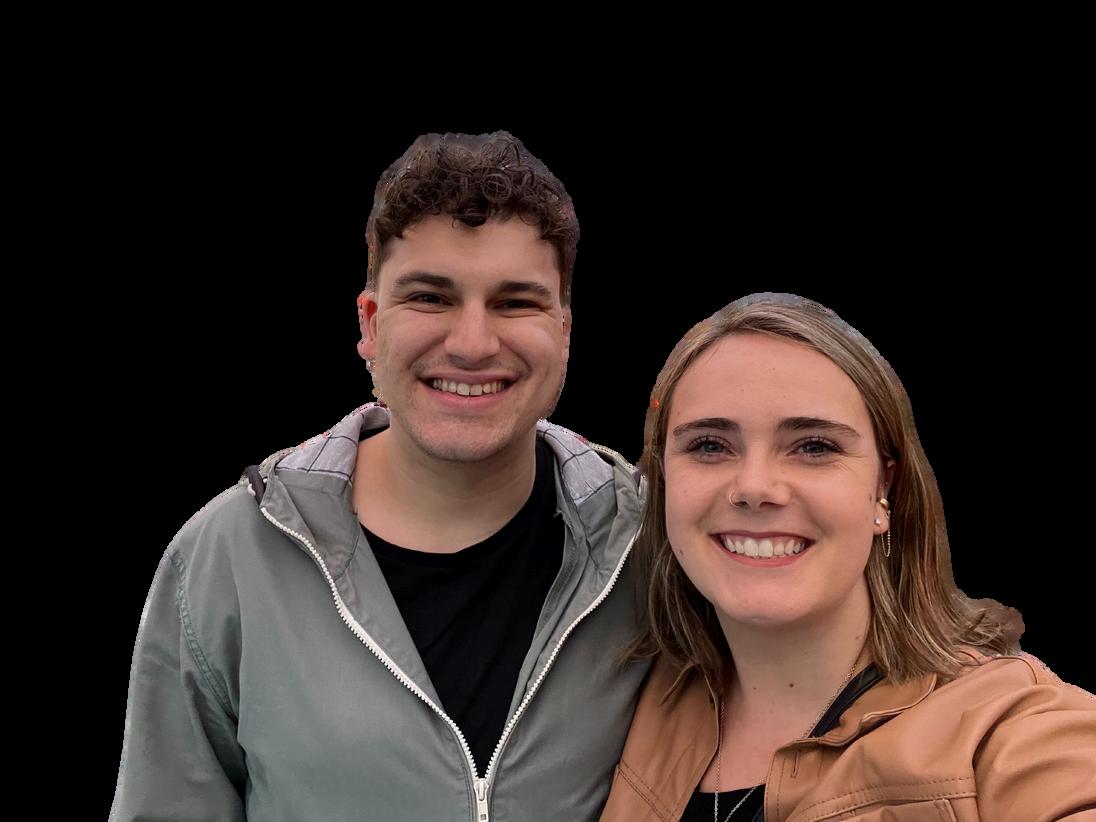
Will Taiwan-caught fish be removed from United State’s produced by forced labor list?
Migrant

PRAYER REQUESTS
PRAY for Cafe Jiwa as we prepare to open for business.
PRAY for Ligit as she returns to Indonesia for a six-month home assignment. She’ll be traveling all over Indonesia sharing about the physical, emotional, and spiritual needs of the Indonesian workers in Taiwan.
PRAY for Nathan & Laura as they travel to Indonesia in early 2025 to be with Ligit and share the vision of Jiwa International with Indonesian churches and community groups.
PRAY for those far away from home and loved ones, that they would experience the goodness of God in their hearts and lives.
PRAY that God would continue to direct us and allow us to build quality relationships with the Indonesian people in Yunlin County, Taiwan.
ON THE HOOK: WILL TAIWAN-CAUGHT FISH BE
REMOVED FROM UNITED STATE’S PRODUCED BY FORCED LABOR LIST?
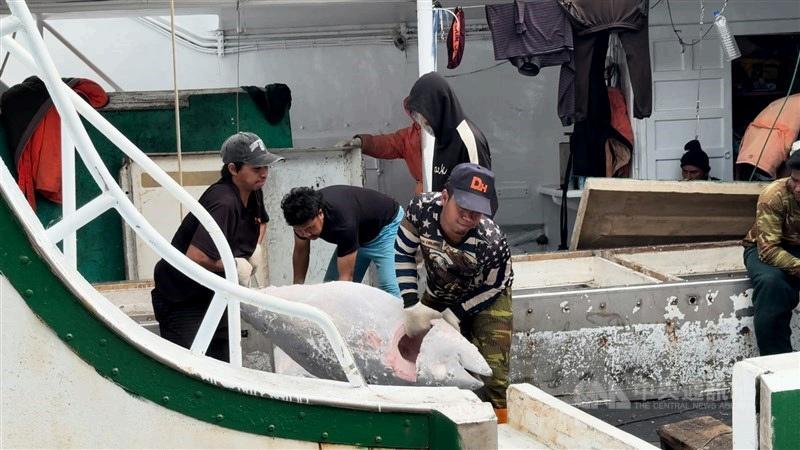
Written by Nathan Conklin
Every two years, the United States Bureau of International Labor Affairs publishes a list of various goods and their respective source countries that the US government determines to be produced by either child or forced labor. The 2022 “List of Goods Produced by Child Labor or Forced Labor” named 159 goods from 78 countries. This list does not specifically call out specific companies or individuals and the Bureau says is not intended to be punitive, but is intended to raise public awareness and encourage changes to unhealthy labor practices
Taiwan’s fishing industry has been flagged for its use of forced labor in both the 2020 and 2022 list. The 2022 report says that Taiwan’s fishing fleet is the second largest in the world and employs an
estimated 35,000 migrant workers. Reports of contract substitution, made-up fees or expenses illegally deducted from wages, confiscated identity documents, eighteen to twenty-two hour workdays for months spent at sea, and physical/verbal abuse have led to the United States including Taiwan-caught fish on its list
Over the last few years, the Taiwanese government has said that it has taken steps to ensure its fishing industry is in alignment with international work practices and laws, but deepsea migrant workers say that their lives have not improved by much and their experiences suggest that Taiwan may not be removed from the 2024 report
WORKERS FACE HUNGER AND DEHYDRATION, LIVE IN DEGRADING AND UNHYGIENIC CONDITIONS, ARE SUBJECTED TO PHYSICAL VIOLENCE AND VERBAL ABUSE, ARE PREVENTED FROM LEAVING THE VESSEL OR ENDING THEIR CONTRACTS, AND ARE FREQUENTLY NOT PAID THEIR PROMISED WAGES OR HAVE FOOD AND LODGING FEES ILLEGALLY DEDUCTED FROM THEIR WAGES.
UNITED STATES BUREAU OF INTERNATIONAL LABOR AFFAIRS
2024 LIST OF GOODS PRODUCED BY CHILD LABOR OR FORCED LABOR SPEAKING ABOUT MIGRANT FISHERMEN IN TAIWAN
One of the primary challenges to ensuring that labor laws in this industry are followed is the nature of deep-sea fishing. Departures and arrivals to port are scheduled ahead of time, meaning that abusive captains know exactly when and where to expect government or NGO inspectors. The months spent at sea are often in distant international waters out of reach of government officials. Additionally, very few of these shipping vessels have Wi-Fi or access to any form of communication with the outside world
While the Taiwanese government says that there are hotlines and confidential processes that protect migrant fishermen from retaliation from their bosses, protections do not go far enough to ensure their economic stability. The type of working visa they are given as deep-sea fishermen only allow them to be on Taiwanese soil for one to two weeks at a time. Meaning that it is realistically impossible to file a grievance and find a new employer before they must leave again Consequently, although their grievance may be investigated and the abusive captain may eventually face fines or even loss of their fishing license, the migrant worker who filed the grievance has long ago been deported for overstaying their visa. Migrant fishermen know that reporting illegal labor practices onboard will only lead to them losing their job.
The reports pointed to by the Taiwanese government as evidence of its recent progress in protecting migrant workers are likely wildly optimistic. The Fisheries Agency reported in the last two years that it has inspected 80% of its fleet and found 89% of these vessels have fully complied with working hour regulations. They also say there were no reports of wage garnishing or other illegal fees for 95% of these vessels. Critics say these reports are based off coached or coerced responses by migrant workers
Advocates say that while the Taiwanese government has made progress in creating regulations and processes to protect migrant deep-sea fishermen, not enough has been done to ensure that these regulations are being followed and that fishermen can report abuses without jeopardizing their own and their families’ economic security. They hope that Taiwan-caught fish remain on the United States 2024 List of Goods Produced by Child Labor or Forced Labor

COMING SOON:

Sincearriving in Taiwan, Jiwa staff have heard many stories about the situations faced by migrant workers from Indonesia. Some stories are positive and others are incredibly sad. In order to gain a broader picture of the situation in Taiwan, record specific stories, and to advertise our mission, we conducted a survey of migrant Indonesian workers (see page 19 for results of this survey). We received responses from all over the island and now have a slightly better grasp on the ways in which we can serve this population.
One of the things we found to be in common across Indonesian and other Southeast Asian migrant workers in this area is that it can be hard to access products and flavors from home Migrant workers who live in Taiwan’s larger cities or near a train station are able to access grocery stores, restaurants, phone shops, and other shops that cater to the foreign worker population. If you go from Taipei Main Station into the underground shopping center, you would be forgiven for thinking
you somehow took the wrong train and ended up in Indonesia due to the many Indonesian shops and restaurants.
Many of these kinds of businesses are located right outside major train stations so that people from all over can conveniently access these shops. However, if a worker is assigned to work in a town that does not have a train station, there is no easy way to make it to these little pockets of Southeast Asian culture on their one day off (if they’re lucky enough to even have that much). And the reality that Taiwanese cuisine features many pork dishes, which are forbidden in the Islamic faith, means that finding places to eat out can be difficult. In the area where Nathan & Laura are currently operating, there is no train station The closest train station is about 30 minutes by car, close to two hours by public transportation, and almost impossible to reach by the electric bikes that many workers rely upon as their main mode of transportation.
Even before arriving in Taiwan, Nathan & Laura thought that opening a cafe or restaurant offering halal Indonesian food and drink items might be a great way to build relationships and community with the migrant worker community.
They both worked with the Aroma Cafe in Taipei while with Envision and both studied Business as Missions, so it seemed like a great fit. What they didn’t know is that the seeds for an Indonesian cafe and ministry center were planted years before they were even aware of this need
Ligit (see partner spotlight on page 11), is an Indonesian International Worker sent out by the Indonesian Alliance Church. She arrived in Taiwan in 2019 and did language studies before moving to the city of Tainan as her first ministry assignment. It was here that she was praying asking God to give her wisdom regarding the best way to reach out to the Indonesian community At that point, she would go to the local city park to meet with the Indonesians that gathered there on the weekends, but the summer heat and rain would quickly cancel any plans they might have to get together. It was during one of her prayer times that God gave her an image She sketched out this image knowing that this idea was outside of her ability and visa restrictions, but still put this image up on her fridge as a reminder of what God wanted to do The picture she drew was dated August 26, 2021. She wondered when God was going to provide teammates for her and how this vision was to come true. She prayed for this vision to come true and that God would send teammates, specifically a married couple, to help her make this dream come to life
It was just a few weeks later in midSeptember 2021 that Nathan & Laura were asked to move to Indonesia
At this time, moving to Indonesia felt out of the blue, yet still felt like where Nathan & Laura were being led As they approached the end of the first half of their term in Indonesia and were preparing to return to America for a home assignment, it was clear that they weren’t supposed to stay in Indonesia, but where did that leave them? The Jiwa Journal 2024 Vol 1 tells the story of what happened next in the fall of 2023, but after they returned to Taiwan with Jiwa International they told Ligit of their idea to open a cafe.
It was at this point that Ligit told Nathan & Laura of the visit God had given her and the picture she had drawn. She went through her things to find the picture and showed it to them.
The vision that God had given Ligit three years before was to open a cafe and community center. Little did any of them know that back in 2021, was God not only giving our team the idea, but he was orchestrating moves across the world so that Nathan & Laura would have the cultural and linguistic ability to partner with Ligit to reach out to the Indonesia community.
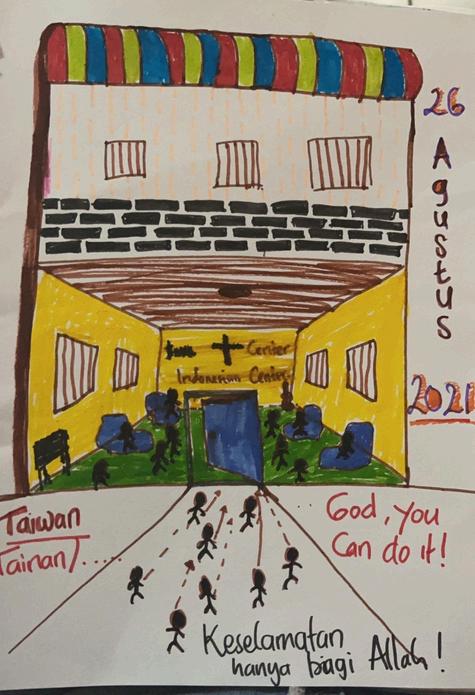
The time between August 2021 and when this team was able to actually be in person together in May 2024 was not all easy There was lots of confusion as to why God didn’t seem to be providing teammates and why it seemed like they were being sent on wild goose chases. Seeing the working of God in retrospect doesn’t make the challenges of the previous chapters suddenly easy to be thankful for or make everything suddenly make sense. Nor does it mean that God was intentionally causing harm to us or putting barriers in our path for the fun of it But it is a reminder that God is working in our lives, even when we can’t see it, and He truly can make everything work together for good.
Today, work continues on developing Cafe Jiwa The permanent residency that Nathan earned by teaching English has streamlined the process of opening an LLC in Taiwan called Cafe Jiwa Corporation.
This company is a central part of creating community and meeting the physical, emotional, and spiritual needs of migrant workers in Taiwan. In addition to migrant workers being our target demographic, our primary staffing base will be Southeast Asians who have been married to Taiwanese men.
A Taiwanese nonprofit, TransAsia Sisters Association, estimates that there are over 144,000 foreign spouses from Southeast Asia in Taiwan These foreign spouses have Taiwanese citizenship, yet still face similar issues to migrant workers in the form of discrimination, inability to access higherpaying jobs, and finding community. These foreign spouses have the legal ability to work in Cafe Jiwa and their ability to speak Chinese and a Southeast Asian language makes them a perfect hire. These people also represent phenomenal bridge builders between the migrant worker and Taiwanese populations
Cafe Jiwa will provide a halal menu for our Muslim friends, serve Indonesian drinks in addition to a traditional coffee menu, and eventually expand into Indonesian food options as well.
The business itself will be a ministry to the migrant worker population. While we’re still in the process of opening the first shop, the potential to grow Cafe Jiwa Corp to other parts of Taiwan to provide employment opportunities to foreign spouses and providing a safe and welcoming environment for migrant workers is exciting
We have found a fantastic building on the main road of Yuanchang Township, just down the street from our partner Taiwanese church The space is over 11,000 square feet and is practically move-in ready Only very minor renovations are necessary to make the space ready for what we have in mind.
Alongside the cafe operations, Jiwa staff and partners will use the second floor of this building to provide language and vocational skill classes as well as various events.
There seems to be great excitement building both in our town and in our various networks for Cafe Jiwa. The downtown area of Yuanchang Township currently does not have a coffee shop or really any other place where people can go to gather over drinks in air conditioning
In addition to future customers, people from Taiwan, Indonesia, and America Christians, Buddhists, and Muslims are all giving funds, physical items, advice, and encouragement to help get Cafe Jiwa up and running Together, we are building this space up into a blessing for the migrant worker and Taiwanese community in Yunlin County.
Jiwa International has initiated the “Fill Our Space” Campaign to raise $30,000 for the initial start-up costs for Cafe Jiwa by the end of 2024. Please consider helping us meet this goal so that we are able to get Cafe Jiwa open and serving the migrant worker population as soon as possible!
Check out our social media pages or www.jiwainternational.org/cafe for ongoing updates regarding the development of Cafe Jiwa.
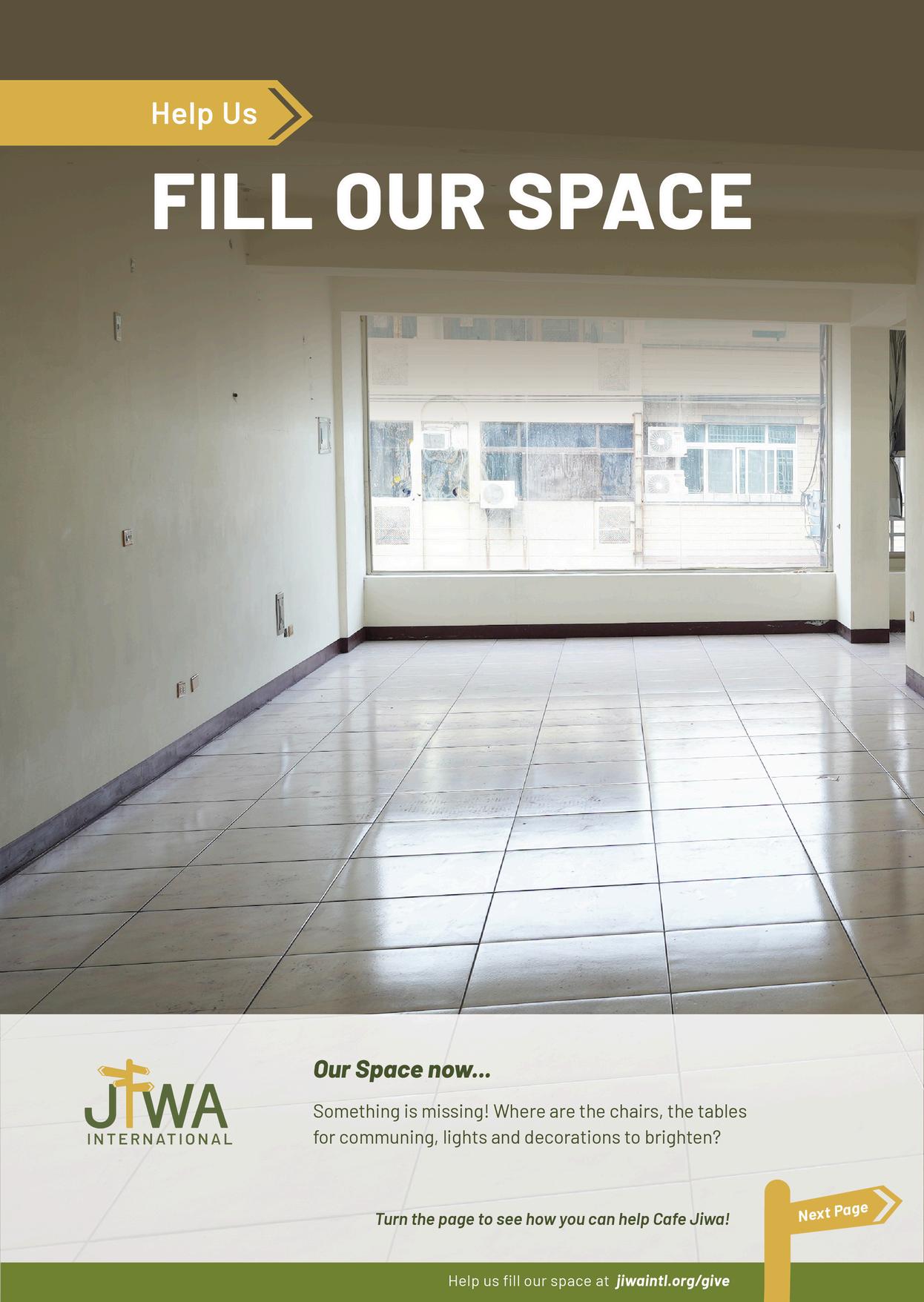
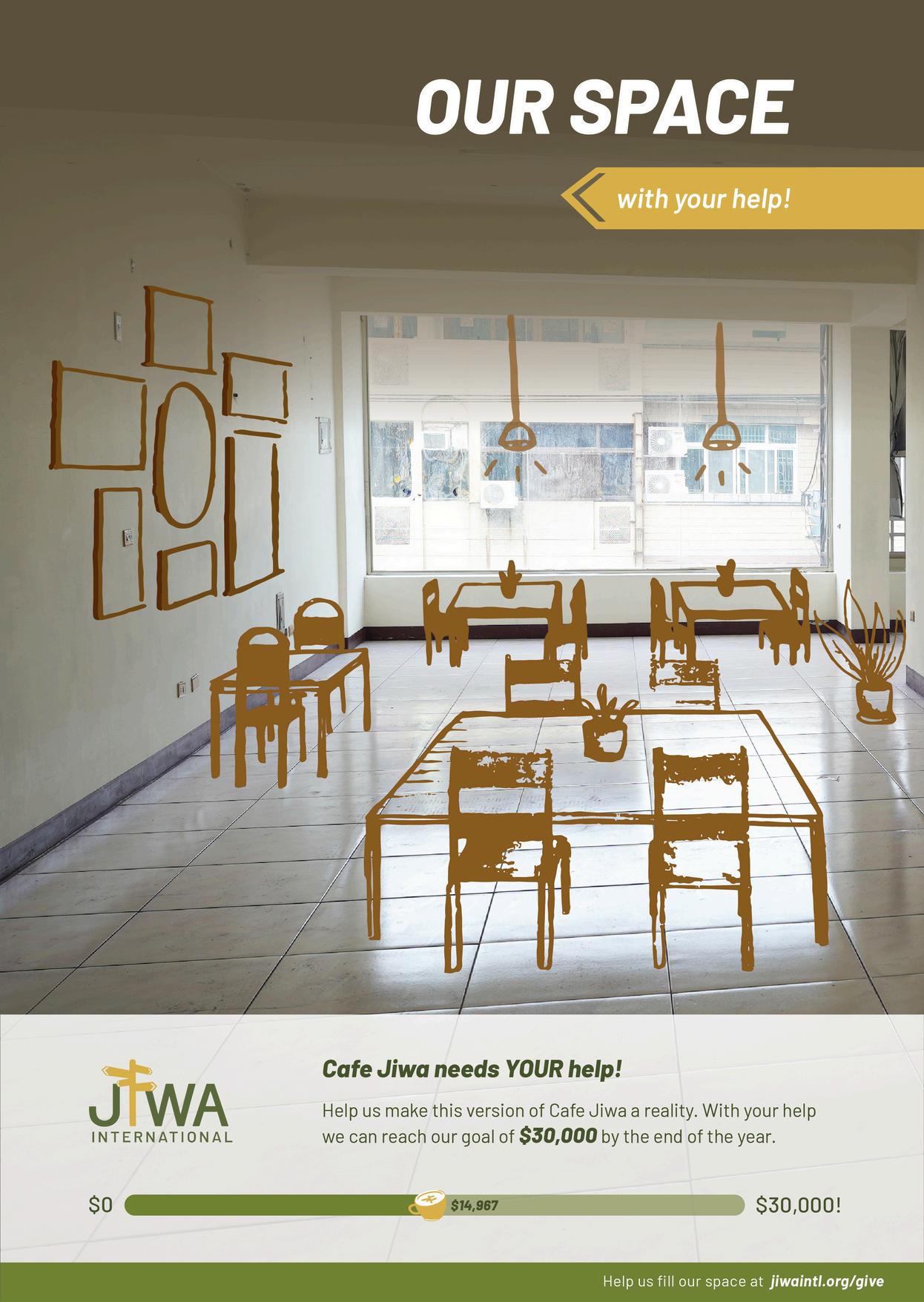
HPARTNERIGHLIGHT:MEET LIGIT
Marsiliati Ligit grew up in a small village in East Kalimantan, Indonesia Her father is a pastor with the Gereja Kemah Injil Indonesia (GKII), the Indonesian Christian & Missionary Alliance church As the eldest of four children, there was a certain amount of pressure to follow in her father’s footsteps. But, she also knew that she wasn’t called to the same things as her parents.
She knew firsthand the impact of international missions workers. She is fourth generation Christian in her family, but her great-great-grandfather was the last person in her village to become a Christian. As the village Shaman, her ancestor was extremely resistant to the Good News brought to her village by missionaries.
This history was part of the reason she decided to pursue international work with the GKII. After finishing seminary and working in a local church for two years, Ligit moved to Taiwan in 2018 to work alongside the American & Taiwanese Alliance churches to reach out to the migrant Indonesian workers in Taiwan.
Her first visit to Taiwan was on a vision trip with other leaders from the GKII. During this time she was able to meet with American missionaries, fellowship with local Taiwanese congregations, and dream with her team about the future This trip wasn’t all easy though During one evening of worship she suddenly felt a spiritual darkness fall upon her She recounts that she was singing along with the music when suddenly her vision grew fuzzy, she couldn’t breathe, and felt like she was about to be sick She ran to the back of the room and collapsed on the floor Others came around her and she could hear them talking to her, but their voices felt far away She remembers praying, “God, if this is my time to go, so be it But if this is not of you I command these dark forces to begone ”
Instantly, her vision and hearing returned and she was able to stand back up and join the worship time. While the trip overall was positive and confirmed the direction she sensed God was leading her, this experience reminded her that this wasn’t going to be an easy journey and that there was going to be resistance.
After returning to Indonesia, she moved from Kalimantan to Bandung where she lived with Susan M., one of Jiwa’s current board members, for six months doing some intensive English language studies. She then studied Mandarin for two years in Kaoshiung in southern Taiwan before moving to Tainan.
Soon after her move to Tainan, the COVID-19 pandemic gripped the world and most of her work encouraging the migrant worker population in Taiwan moved online. The Indonesians who had come to Taiwan to work found themselves isolated from the few pockets of Southeast Asian communities in Taiwan due to lockdowns and social distancing. They found themselves forced to remain in their workplaces indefinitely Most people around the world found themselves “working from home”, but not as many of us found ourselves “living from work” like the migrant workers did during this period of time
In order to provide community and encouragement to these workers, Ligit developed online chat groups and video calls where these migrant workers could log in to share their experiences and socialize with others in similar situations Later, as the world slowly came out of isolation, she prayed about how she could best reach out to this population After a home assignment in Indonesia for six months, she moved to Yuanchang to partner with a Taiwanese church that was looking to find ways to reach out to the Indonesian workers in the area. It is there now that she and Nathan & Laura make up a team working to develop Indonesian ministry.

Jiwa Snapshots

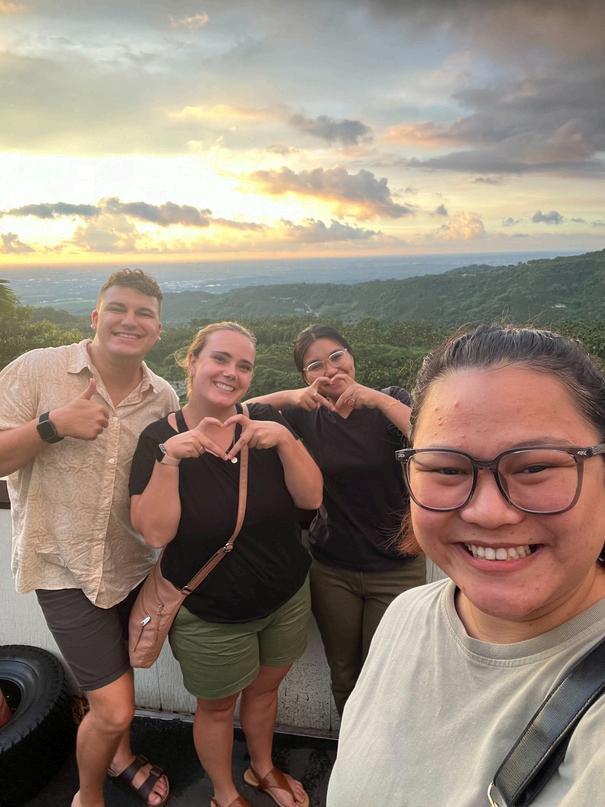
Teamwork makes the dream work! Nathan & Laura are partnered with Ligit (read her story on page 11) sent by the Indonesian Alliance Church. They were also joined this summer by Ratu, a university student from Indonesia doing an internship with Ligit and Jiwa.
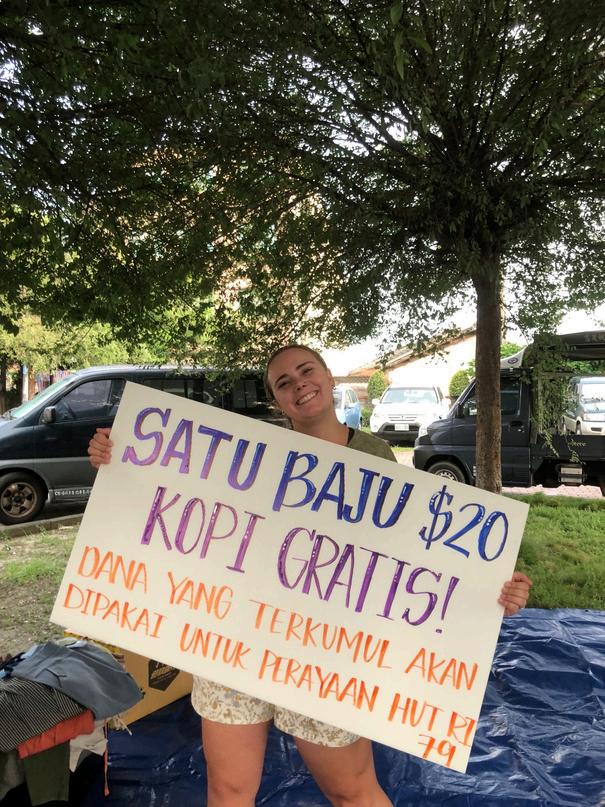
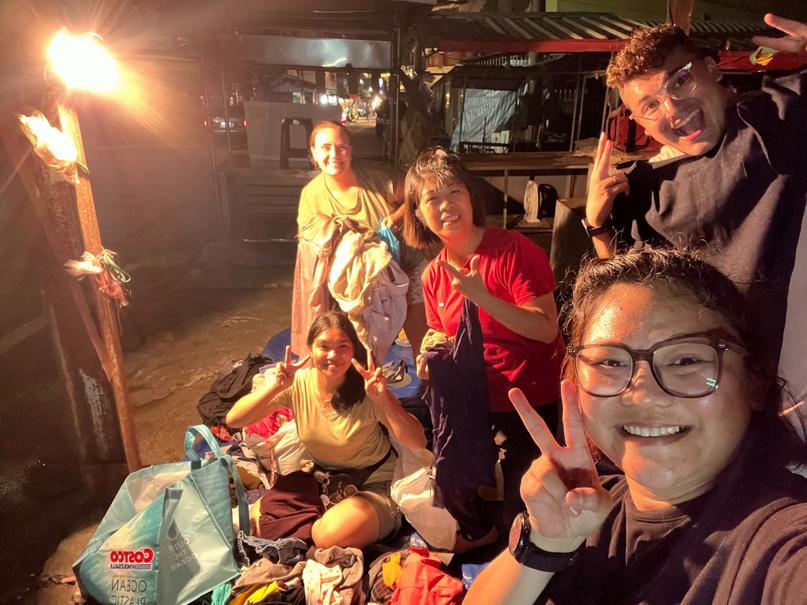

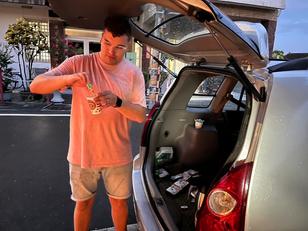


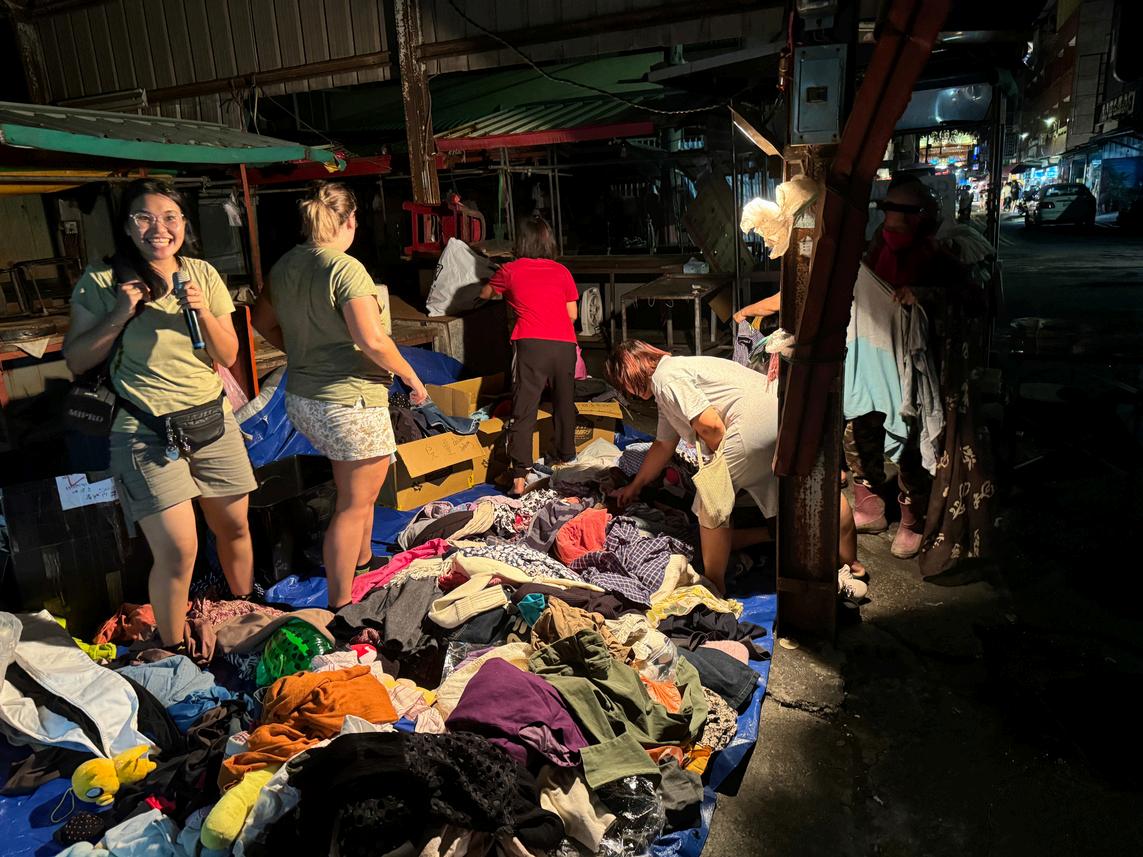
As many migrant workers are the primary providers for their families, there is rarely much leftover spending money for them to use for their daily lives Jiwa was given boxes of used clothing that we sold for cheap at a local night market. About thirty migrant workers came out and picked through the available clothing This sparked the idea to have the thrift store as a part of Cafe Jiwa.
Surveying Local Migrant Workers
In July 2024 we created a survey and invited migrant workers to tell us their stories. We gave them a small packet of sambal or instant coffee as a thank you for their time. Results of this survey are discussed on page 19 of this issue of The Jiwa Journal
Pop-Up Thrift Store
Board Members on the Ground
Two of our board members, Chad & Emily Brubaker, were in Taiwan for 10 days seeing first-hand Jiwa’s work in Yunlin County. They also happened to be in town when we signed the contract for our building, so they helped us create blueprints for remodeling and dream about how to fill the space.


Indonesian Independence Day
August 17 is Indonesian Independence Day and we hosted two different events that weekend in two different towns. These events were intended to celebrate Indonesia’s independence as well as build community and encourage the migrant worker population We provided food, drinks, and games from Indonesia as well as having obligatory karaoke One person said that it felt like Indonesia in Taiwan for a day; exactly what we wanted to provide!
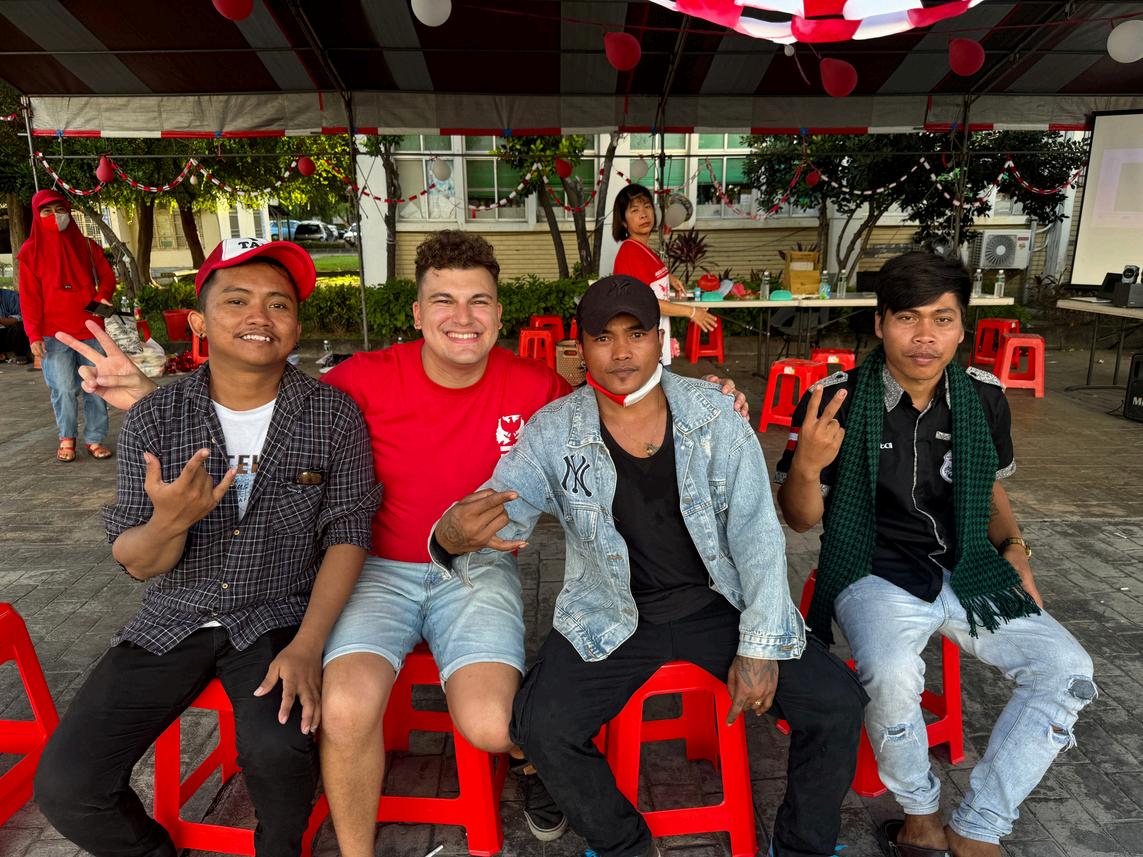



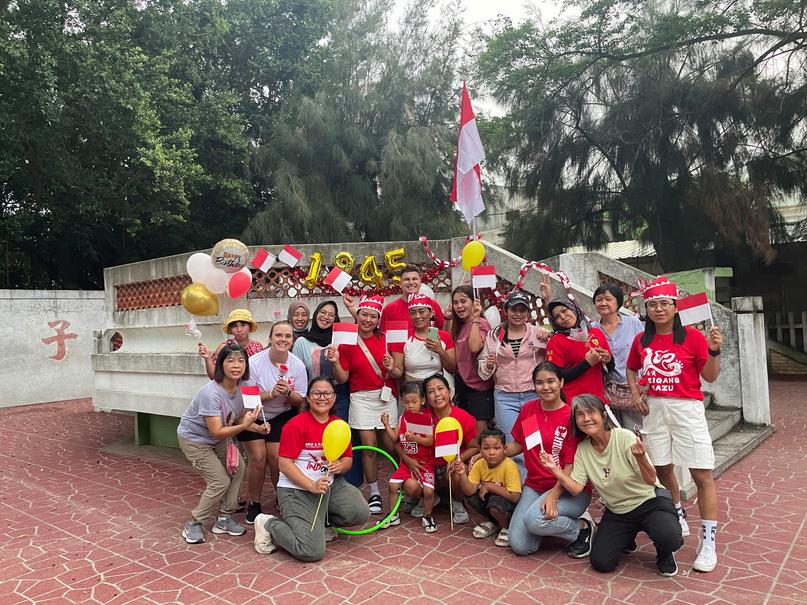
MOTIVATIONS & CHALLENGES FOR INDONESIAN MIGRANT WORKERS ABROAD
Written by Wiwi Purwanto
Indonesia, a country rich in natural resources and cultural diversity, is also home to many individuals who seek job opportunities abroad In 2023, the number of Indonesian migrant workers (PMIs) was recorded at 274,965, representing a growth of about 40% since the previous year. The decision for Indonesians to work as migrant workers is influenced by a complex interplay of economic, social, and political factors. Understanding these motivators is crucial for addressing the challenges and opportunities faced by these individuals and for improving their working conditions
Many Indonesians migrate for work in pursuit of improved economic prospects. According to a February 2024 survey by Goodstats, 40% out of 1,012 respondents cited higher wages as the primary reason for migration Jobs abroad often offer better salaries compared to domestic employment. For example, labor-intensive roles in construction, domestic work, and agriculture in countries like Taiwan, Saudi Arabia, and Malaysia can provide significantly higher pay than similar positions in Indonesia. Notably, no region in Indonesia has a regional minimum wage above USD$313, equivalent to Rp 5 million per month; whereas the average monthly salary of a full-time worker in Taiwan is USD$848, approximately Rp 13 million per month
The scarcity of employment options accompanied by the limited availability of local job training and educational opportunities is another factor leading Indonesians to migrate. As a result, many people are looking for job opportunities abroad while seeking to acquire new skills and experiences, which can enhance their long-term career prospects both overseas and when they return home. For instance, Germany's Ausbildung program offers theoretical and practical training for German and non-German students for three and a half years. It often culminates in students being offered employment by companies
Cultural factors, such as familial expectations and the desire for a better standard of living, drive Indonesians to seek work opportunities overseas, leading to an increase in migration. Remittances play a crucial role in the lives of Indonesian migrant workers and their families, serving as more than just personal income For many, the income earned overseas represents a significant portion of their household finances These remittances are used for various needs including education, healthcare, and home improvements, making a significant contribution to the economic development of both the family and the local community.
The Indonesian government, along with recruitment agencies, plays a crucial role in facilitating labor migration by implementing policies and agreements that manage the flow of workers and ensure their legal employment abroad. However, despite government regulations aiming to protect migrant workers, the reality often involves navigating a labyrinth of bureaucratic procedures and dealing with recruitment agencies that may not always prioritize workers’ rights Recruitment agencies, while providing essential services, sometimes contribute to exploitation and abuse Migrant workers may face high recruitment fees, deceptive practices, and inadequate support during their employment abroad. Addressing these issues requires stronger regulatory oversight and better support systems for workers.
The migration of Indonesians for work is driven by a combination of economic necessity, limited employment opportunities, and political and social influences While it offers economic advancement and skill development, it also presents significant challenges. Migrant workers often encounter labor rights issues, such as exploitation, poor working conditions, and limited access to social services. Addressing these challenges requires a collective effort from governments, employers, and advocacy groups to ensure fair treatment Jiwa aims to tackle these challenges by establishing migrant communities in destination countries to provide essential support and guidance and easing the migration process through practical and emotional assistance. Currently, Jiwa has staff on the ground in Taiwan to assist migrant workers in building a supportive and meaningful community.

Jiwa receives 100% of your donation thanks to our giving platform, Zeffy.
Use Jiwa’s referral link to set up an account for your church or nonprofit and start putting every donor dollar towards your mission:
https://t.ly/D4k3E
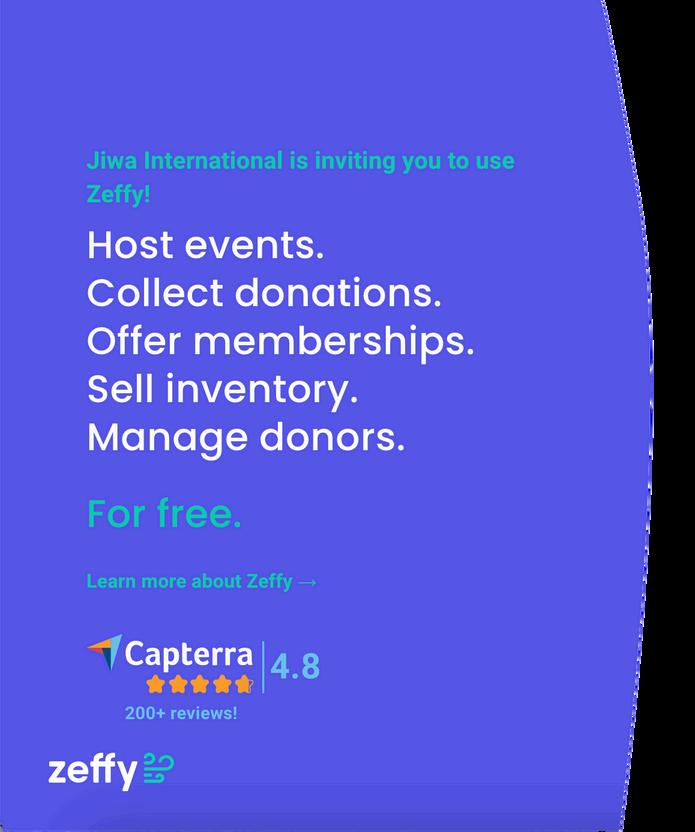
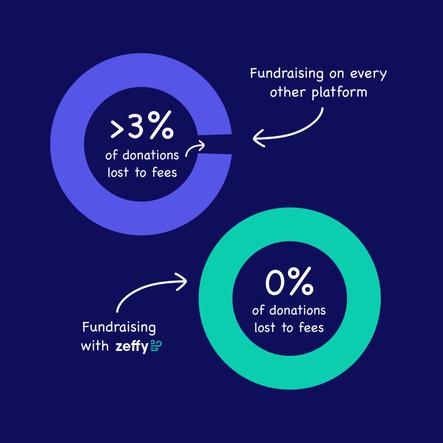

Below deck
MIGRANT WORKERS KEEP THE CRUISE INDUSTRY AFLOAT
In January 2024, Royal Caribbean christened the largest cruise liner in the world The Icon of the Seas can carry up to 5,610 guests and boasts eight different neighborhoods which allows travelers of all different styles to enjoy the ship equally The Icon has twenty decks, an indoor water park, an ice-skating rink, seven swimming pools, and even an on-board waterfall
Although the fate of the global cruise line industry seemed in peril during the COVID-19 pandemic, especially after the nightmarish reports from passengers aboard the Diamond Princess cruise liner after being barred from disembarking in Japan after cases of COVID-19 were found on the cruise ship, the cruise industry has rebounded incredibly in the years since the pandemic began.
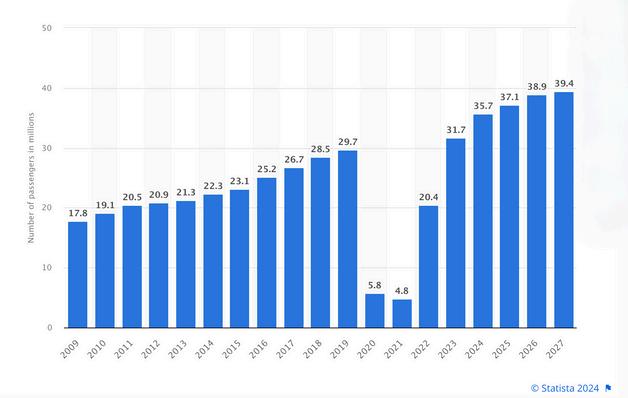
In 2021, even amidst one of its most challenging years due to pandemic travel limitations, the global cruise line industry was worth $7 25 billion USD, but is expected to grow another 11% by 2028
The cruise line industry says that 85% of people who have cruised before will return to cruise again The high customer retention rate of 27% of first-time cruise passengers (up 12% from the prior two-year period), gives the cruise line industry confidence to build increasingly large ships to keep up with this growing demand from consumers.
One of the elements of cruising that is attracting increased passengers is that cruises are allinclusive. Not only when it comes to food and drink, but also entertainment and transportation. Passengers only need to concern themselves with booking one flight to the departure point and then the rest is taken care of for them.
The cruise line industry knows how important all-inclusivity is and the quality of service is to its continued success. The ship crew members are the first line of contact with passengers, meaning that a large crew of friendly and hardworking people is necessary to the industry’s success
To accommodate its 5,610 guests, The Icon of the Seas has a crew of 2,350 to handle everything from navigation to housekeeping Other cruise lines that offer even more luxurious services typically have a lower passenger-to-crew ratio. If you have ever been on a cruise, you will have noticed that the crew is made up of people from all over the world. About 70% of cruise line crew members are from low-income countries.
Cruise lines often celebrate this statistic as proof of its workplace diversity and positive force for economic development. A single cruise line may employ people from more than 50 different nations, with 40 or more nationalities represented on any individual ship They sometimes welcome their passengers to a “mini-United Nations” and advertise the staff’s diversity as part of the international allure of taking a cruise. And while elements of this may be true, there are often many inequalities that these crew members face.
Although the cruise line companies are American and European, the ships these companies own are typically registered in small, often less-developed countries such as Panama, Liberia, Antigua and Barbuda, Barbados, Cayman Islands, and others This system is known as Flag of Convenience (FoC) and allows ship owners to register their ships in a foreign country and use the flag while at sea This means that the laws governing the ship and its operations are those of the ship’s flag country, not the country in which the parent company is registered.

For example, if Royal Caribbean registered its ships in the United States (where its corporate headquarters is located) rather than in other countries using the FoC system, its crew would be required to be at least 75% American citizens, be paid the US minimum wage, and would have all other American labor regulatory protections.
Ships registered under the FoC system do not have these regulations, allowing the cruise line industry to recruit labor from around the world and pay wages according to a crew member’s country-of-origin rather than a ship-wide standard
Crews are often sorted into three sections: officers, staff, and crew Officers are those like the captain and others responsible for navigation and the efficient running of the ship and its various on-board activities. Staff members are those who work in the shops, casinos, bars, gyms, and provide entertainment. Crew members are those who work in the kitchen, dining rooms, or housekeeping.
What various reports have shown is that a person’s country-of-origin is often the determining factor in what section of labor they are assigned to. American & Western European workers typically work as officers, Eastern Europeans are assigned to staff positions, and those from developing countries work make up the crew positions.
While all three sections of a cruise ship’s crew work long hours, have few days off, and must be away from their families for months on end to make sure each passenger enjoys their vacation, the contracts and on-board benefits favor those coming from more highly developed countries
Officers and senior staff are given cabins above the waterline which are shared with only one other staff member They can use the pools and can eat at the same restaurants as passengers Lower-level staff and crew are housed far below deck in cramped rooms, are given leftover food, and could face disciplinary action if they go beyond a certain point into areas where passengers may be
Workers from low-income countries do make significantly more on a cruise ship than they could in their home country. Additionally, the ability to travel and meet people from around the world is an attractive opportunity for many from underdeveloped countries. However, when they face unfair working conditions, non-secure and short-term contracts, inflated costs including illegal agent's fees to secure a job, racial and gender discrimination, and other
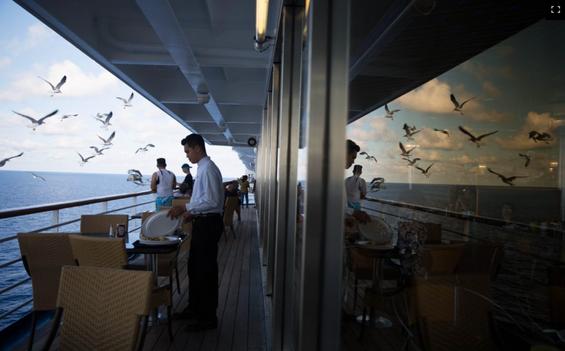
challenges in the course of their employment, they have little recourse due to the FoC system. Additionally, their high dependence on their job to provide for themselves and their families back home leaves them in a poor negotiating position when looking at a new contract.
Crew members from developed countries can secure long-term, favorable contracts due to their relative financial security back home and specific skills that few can do. Crew members from lessdeveloped countries often must quickly sign a new contract without being able to negotiate for better terms because there are so many others willing to take their job. Additionally, it is rare for a crew member to be promoted or to be moved to a different type of work, meaning the country-oforigin social stratification of the crew stays in place.
The cruise line industry could not stay in business if they were unable to source labor from around the world Also, many workers from around the world can provide a better life for their families through these types of working opportunities While international labor provides a unique business opportunity and upwards mobility for international workers, we should still demand basic needs are met and the claims made by these multinational companies are indeed true
If you ever find yourself on a cruise, take the time to get to know and genuinely thank the many crew members who work hard to make your vacation as wonderful as it is Acknowledge the human faces all around you, in all their diversity and beauty, and honor the stories that have brought them onboard.

An Indonesian worker cleans off a table on a cruise ship
Photo by: Almudena Toral/Univision
JIWA INTERNATIONAL SURVEYS MIGRANT WORKERS IN YUNLIN COUNTY
In order to get a better picture of the situation of Indonesian migrant workers in the area in which Jiwa International is currently located in Taiwan, we developed a survey that we gave out to people we met in night markets, at train stations, and at Southeast Asian grocery stores
People originally from across Indonesia responded to our survey from their locations all over Taiwan. We asked both quantitative and qualitative questions to not only understand who and where these workers are, but also what their experiences have been like.
Time in Taiwan
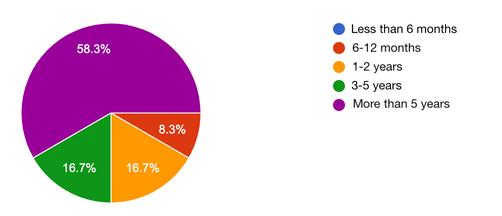
The majority of respondents said that they have been in Taiwan more than five years. Most workers’ initial contracts are three years, but can then renew after the successful completion of this first contract While they may be in Taiwan for this length of time, the women workers especially are rarely in the same town or location for a long period of time. If the elderly Taiwanese passes away they will be moved to a new location Or if there is something that makes the placement difficult for either the receiving family or the worker themselves, they may be transferred to another location, making community building a challenge.
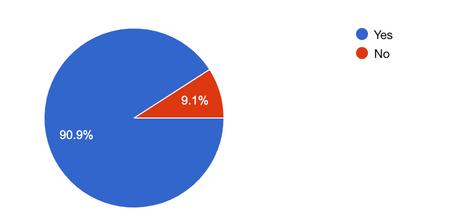
When asked if they were the primary provider for their family back in Indonesia, 90% responded in the affirmative. Due to a challenging economic environment in Indonesia and high unemployment, these workers go abroad in search of better opportunities not just for themselves, but for their entire extended family
Motivation for Coming to Taiwan
The workers we surveyed pointed to improving their economic situation as their primary reason for coming to Taiwan. They cited higher wages in Taiwan, their families’ needs back in Indonesia, and the opportunity to work to provide for their families Some used terms like “change my fate,” “funding the future,” and “financial security” to describe the salaries they receive in Taiwan. A few also mentioned new opportunities and a chance to see the world as motivators for moving abroad
Challenges of Working in Taiwan
Starting a new job is always challenging, especially when it’s in a different country and language. We asked migrant workers what their biggest challenges were and they responded:
Cruel bosses who don’t treat me like a human being
Not knowing the language
Taking care of elderly people with failing health
Lack of sleep
No place to worship
The hot weather
Missing family and friends back home
Free Time
The majority of male factory workers regularly have Sundays off, but the women workers have much less predictability in their schedule Some report being able to ask off whenever they need off as long as its not too frequent while others say they only get one day off every six months. When they do have time off, the Indonesian workers say they like to...
Go to the beach
Achmad Mudzakir, head of the Indonesian Fishermen’s Association in Taiwan (FOSPI), reported that the directive for fishers to stay onboard stemmed from fears that high winds could damage the vessels, leading to them drifting out to sea. The Central Weather Administration had issued strong wind advisories, with gusts reaching levels 9 to 10 on the Hengchun Peninsula, underscoring the danger posed by the approaching storm
Find Indonesian food Travel to new places
Go to Mosque
Spend time with friends Learn new things
Sleep
Community
When asked if it’s easy to make friends while in Taiwan, just over half say that it’s not too hard, but still over 40% say that it can be sometimes difficult or always difficult to make friends This is a serious need that Jiwa intends to help meet through Cafe Jiwa and other projects.

MIGRANT FISHERMEN AT RISK DURING TYPHOON KRATHON IN TAIWAN
Written by: Wiwi Purwanto
As Typhoon Krathon approached Taiwan in October 2024, many migrant fishers in Donggang Township, Pingtung County, found themselves in a dangerous situation Despite local government orders mandating their evacuation and provision of shelter, numerous Indonesian fishers were coerced by their employers to remain aboard their vessels This situation has raised serious concerns about the safety and rights of these workers during extreme weather events
One crew member, Muslimin, detailed a harrowing experience aboard a coastal vessel He and two colleagues were ordered to remain on duty from Wednesday through Thursday, despite official evacuation orders for vessels under 100 tonnes The rough conditions made even simple tasks, like going to the bathroom, dangerous
Under the Disaster Prevention and Protection Act, local governments have the authority to issue evacuation orders for crews during natural disasters Shipowners who violate these orders can face fines ranging from NT$50,000 to NT$250,000 (approximately US$1,565 to US$7,830). However, enforcement of these regulations proved challenging. Hsieh Chun-yi ( 謝 俊 億 ) from Pingtung County’s Marine and Fisheries Management Office acknowledged the complexities involved, stating that while there was an understanding that crews should be evacuated, there were concerns about the implications of leaving vessels unattended during the storm.
Reports of similar situations emerged from other fishing ports, including Kaohsiung's Cijin District, where migrant fishers were also compelled to stay onboard despite evacuation mandates. The failure of shipowners to comply with safety regulations has raised alarms among advocacy groups. Allison Lee (李麗華), secretary-general of the Yilan Migrant Fishermen Union, emphasized the need for proactive measures by authorities, suggesting that officials should visit fishing ports to ensure that evacuations take place well before a typhoon hits.
The condition of migrant fishers during Typhoon Krathon highlights the intersection of labor rights and emergency readiness in Taiwan As the government and fishing associations grapple with the enforcement of safety regulations, the well-being of vulnerable workers remains at stake Ensuring the safety of migrant crews is not only a legal obligation but also a moral imperative, requiring urgent action to safeguard their lives during natural disasters The events surrounding Typhoon Krathon serve as a critical reminder of the need for systemic changes to protect those migrant workes who risk their lives at sea
Films TellingMigrant Stories
Films can entertain us, make us think, and help us see the world from another perspective The following films tell the story of various people and families in various stages of migration Some have immigrated into a new country in search of a better life, some find themselves trapped between countries as refugees, and others are wrestling through the multiple identities and cultures within their families Through these films, we can gain a better understanding of the immigrant experience
While all of these films are powerful representations, not every film is appropriate for each person. Please note the rating and make your own decision before watching. Grab some popcorn, dim the lights, and enjoy the film! Afterwards, discuss the topics and themes within the films with family and friends as we seek to better understand our immigrant brothers and sisters.
Encanto

The Terminal


In this story, we meet the Madrigal family who were forced out of their homes by political unrest In their new magical valley, they learn how to work together in the face of fear of being forcibly displaced again, disappointment, and generational differences



Meet Victor Navorski (Tom Hanks), a man without a country stuck in the international terminal at JFK Airport after his home country collapses and his travel documents become worthless Themes of friendship and the importance of a supportive community in the face of challenges run throughout this film.

Limbo The Farewell


A comedic film focused on the lives of four asylum seekers waiting on a remote Scottish island for news about their application We witness the uncertainty migrants often face as they wait within bureaucratic systems to see if their dreams come true or they are deported back to the situations they’ve just escaped.
The Donut



An emotional look at the cultural, linguistic, and generational gaps immigrant families often experience An Asian-American woman (Awkwafina) returns to China to say goodbye to her grandmother who has been diagnosed with terminal cancer, but the family’s decision to keep Grandma in the dark regarding her condition challenges the main character’s learned American ideals and values

Minari


This documentary tells the story of Cambodian refugee Ted Ngoy, who built a multi-million dollar donut empire up and down the West Coast after escaping the brutal Khmer Rouge in the 1970s The film looks at immigration, assimilation, prejudice, and who gets access to the American Dream.



A Korean family moves from where they’ve lived in urban California to rural Arkansas in search of the American dream they were expecting after immigrating from Korea A challenging look at what the American dream means and what is really important in life.

WANT TO GET INVOLVED?
Our vision for identifying and meeting the needs of migrant workers goes beyond only the Indonesian migrant workers in Taiwan Our current staff have unique experience and abilities that allow us to reach out to this specific people group, but your experiences and abilities could help us expand long-term to helping even more people in unique ways!
We also have opportunities for short-term trips and internships that would allow groups and individuals to work on the ground with Jiwa. Please look at some of current needs below and fill out the inquiry form at www.jiwaintl.org/serve.
Staff, interns, and short-term volunteers of Jiwa International fundraise for their own compensation and/or expenses. Opportunities may be available abroad or in the United States depending on the situation.
Current Opportunities & Needs
Graphic Design
Journalism & Writing/Editing
Curriculum Development
English Teaching Construction & Renovations
Relationship Building
Business-as-Mission
Cross-Cultural/Religious Internships
Short-Term Team
5-10 people
10 days = $800/person + airfare
Meet real needs
Encourage local staff
Gain a global perspective on human migration
Jiwa Apprenticeship
1-11 months on the ground alongside full time staff
Gain personal & professional development
$1200/mo + airfare
Meet real needs
Learn about global cultures
Prepare for a future career in the nonprofit sector

